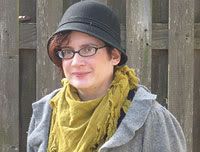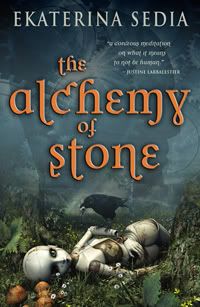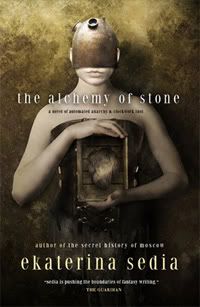Guest Blog: Ekaterina Sedia

Hi everyone,
This is Ekaterina Sedia, and Shara kindly asked me to write a guest post, talking a bit about The Alchemy of Stone (which you have graciously selected as the April book). Now, I'm not one of the writers who have a lot of cogent things to say about the writing process, so I hope a few general thoughts will suffice--or will serve as a jumping-off point for the discussion in comments.
First, I do view all writing as political--I mean, most traditional heroic fantasy is an endorsement of monarchy coupled with an explicit assumption that goodness and power is the birthright of the genetically-blessed few; I don't think it's any less political than feminist or socialist works. The latter however are less familiar and thus often tend to be perceived as more didactic--not necessarily because they are but rather because politics one is not accustomed to encountering tend to jump out more. I don't think it's a good reason to not write about politics though.

So this book is fairly transparently based on the historical events preceding the Russian revolution of 1905 (and 1917)--the anarchist link is I think straightforward; what may be a little bit less obvious is the role of oppressed minorities in the social upheaval. The antisemitism of the Tsarist Russia was so noxious and the scapegoating of Jews so ever-present that many were forced into resistance. I find this topic particularly fascinating, and in The Alchemy of Stone I tried to play with a similar social setup. Of course, things are never as simple as to only involve one minority group.
Second, the only world-building of note I did for this book was to set up the power hierarchy, as well as a general idea of the economy and the governmental structures. The rest I let come through as needed, and I think because of that I don't think of myself as doing much world-building. I mean, I don't have maps and currency tables all worked out, and not even a notebook with how things are supposed to work. I know a ton of writers who do that; I don't have the attention span. On the other hand, I do think it's a matter of integrity to develop a plausible economy (modeling it on the real world is a great shortcut, of course).
I do spend a lot of time thinking about relationships though. Loharri and Mattie, for example; as awkward and awful and messed up that relationship is, this is the most genuine connection either of them has. And I don't really know whether a dysfunctional relationship can ever be good, but I tried to create a degree of complexity that goes beyond good/bad relationship dichotomy. In the modern West, we are conditioned to cut off the relationships that are deemed 'unhealthy'; however, cutting off is not always an option. And sometimes, it might not be what we actually want.

I had a few people ask me whether the ending of The Alchemy of Stone is a cliffhanger; it isn't. I said what I had to say about these characters and the world, and I don't think I'll ever revisit it (although it MIGHT happen, I suppose--never swear off anything). This is not to say that I'm not going to write any more steampunk--for example, I have a book in the pipeline which is steampunk set in Russia, immediately before Crimean war. That one is the alternate history in a true sense rather than secondary world steampunk, like The Alchemy of Stone. Series are just not my thing, and even writing similar stand-alones, like writing the same book over and over again, holds no interest for me. I can certainly see the advantages of getting to play in the same world for more than one book, but it's not for me--at least, not right now. Right now, I try to write books that are as different from one another as I can manage.
Please feel free to ask questions in comments--I'll do my best to answer.
Ekaterina Sedia can be found at www.squirrel-monkey.livejournal.com and www.ekaterinasedia.com. Her upcoming books include The House of Discarded Dreams (July 2010) and an edited anthology Running with the Pack (May 2010)Ekaterina Sedia will be answering under the LJ handle squirrel_monkey.